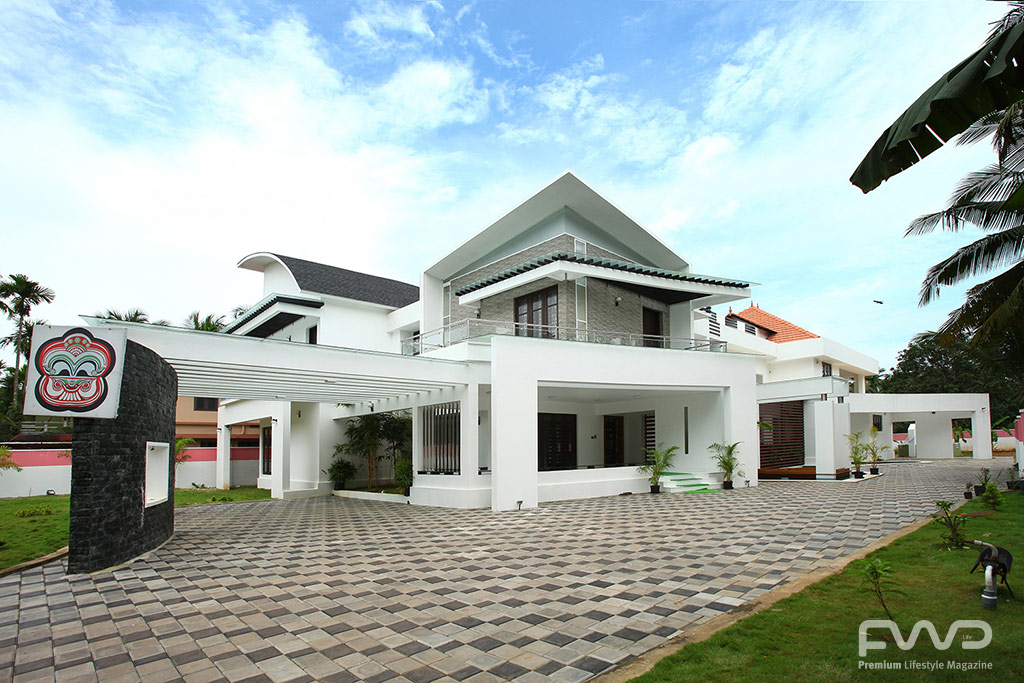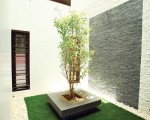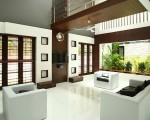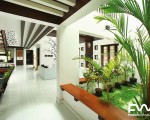Architecture
Moulded in Luxury
This house located in Payyanur, Kerala redefines luxury and is soaked in all natural experiences.
A harmonious home bustling with life! That’s how it could be explained in a single line. When today’s houses are surrounded by miles and miles of concretes, there is ample green inside and outside this house. With a tropical magic in mind, this 7500 sq ft house is created with a perfect blend of luxury and every natural elements inside – sunlight, fresh air, garden and an oasis. This house holds a well kept secret that only those invited have the privilege of experiencing.
Architect K Damodaran leaves a stylish mark on this suburban residence. “Sometimes it is a daunting task to give form to someone else’s imagination especially when there are many things to be given equal care.” says Damodaran, the architect of Saikripa. “But here, the owners have a sense of design.” he continues. When the well-travelled Mumbai based Keralite Mr.Sreedharan approached him to design an expansive house, he knew exactly what he wanted.
Concept
Saikripa’s design took cue from organic architecture where lines between the indoor and outdoor spaces blur. A variety of angles and interlocking forms go beyond minimalism; every line in the design has a purpose which adds to the totality.
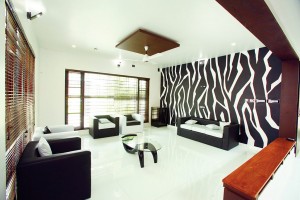 There is a vibrant oasis right inside the living spaces and with view from every room. Incredulously, this cocoon is located in the cerebral system of the house. Every corner of the house is lined with plants and miniature shrubs. The charming corners here tempt anyone to sit back and get relieved from the stress of daily life.
There is a vibrant oasis right inside the living spaces and with view from every room. Incredulously, this cocoon is located in the cerebral system of the house. Every corner of the house is lined with plants and miniature shrubs. The charming corners here tempt anyone to sit back and get relieved from the stress of daily life.
Sunlight from the east, sky-view from the top and fresh air from the west, the smart design incorporates all these. The design is not pure contemporary, but a blend of contemporary with traditional Keralite.
Living Spaces
The house has a spacious formal living area and a private living space. There is an evident blend of traditional with the contemporary, especially with the teak wood panels and partitions.
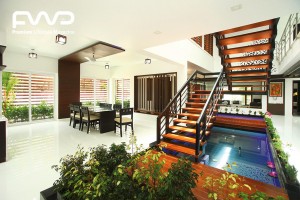 The formal living area takes the visitor away from the private spaces but let them mysteriously glimpse the spaces within through. The oasis with water lilies and the sunken garden around is absolutely spectacular.
The formal living area takes the visitor away from the private spaces but let them mysteriously glimpse the spaces within through. The oasis with water lilies and the sunken garden around is absolutely spectacular.
A teak bridge in the middle extends to the door outside and to the pool outside. It just gives the feel of an outdoor garden on the banks of a pond with benches set in to sit by the side and relax. The glass roof on the top of this space immediately engulfs you in warmth.
The fluid space in living area is further accentuated by the play of lights and shadows. The natural light filtering through the skylight over the central courtyard lends vibrancy to the spaces.
The family living overlooks the greenness on one side. Kitchen is not visible from any of the living spaces as it is separated with plants.
Kitchen and Dining
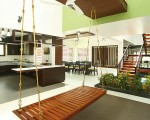 There are two kitchens – an ordinary one and an open one with breakfast counter. Ample natural light flows in here too. The dining space is lined with greenery around giving a feel of outdoor. Vertical adjustable wooden shutters separate dining and private living spaces. A Kerala style ‘aattukattil’ is placed near breakfast counter to enjoy views from here.
There are two kitchens – an ordinary one and an open one with breakfast counter. Ample natural light flows in here too. The dining space is lined with greenery around giving a feel of outdoor. Vertical adjustable wooden shutters separate dining and private living spaces. A Kerala style ‘aattukattil’ is placed near breakfast counter to enjoy views from here.
Bedrooms
There are 5 spacious bedrooms; 2 in the lower floor and 3 in the upper. All rooms are open to the water way inside either directly or through bridges. All bedrooms are attached with spacious bathrooms, inbuilt cupboards, dressing rooms, inbuilt seating panel, lap top area and balconies opening to the greenness around. The master bedroom in the upper space is attached to an open bathroom to feel the rain showers.
Upper Space
The upper space overlooking the water is also interesting. The piece de resistance is the wooden bridge. Just opposite to the home theatre is a gym with all modern facilities.
Interiors
The interiors display a fluid modernism with traditional elements. With a definite lean towards earthy, the décor comes alive with black n white combination. Even though interiors are contemporary there is a classy feel on a whole with teak finishes, wooden blinds and mural paintings.
With subtle accessories, warm colours and contemporary furniture the home spells chic elegancy. The play of ample natural light and interesting accents makes the whole house, especially the water space, the most coveted corner in the house.
The home theatre in the upper space with wooden windows extending to the floor level resembles traditional Keralite temple theatres. The classy looking furniture, black and white themed single wall pictures, touch of traditionalism, all makes it unique.
The magic effect of LED light varies at different places- rainbow effect near water, special effect near greenery, concealed lights and subtle effect in bedrooms.
Colour Scheme
The overall black and white colour scheme stands contrast to blue waters and wooden finishes. Earth tones accentuate the décor and lend character to the fluid living spaces.
Apart from all these the house has a prayer room of which roof extends to the upper space, servant’s outhouse, solar heaters, water purifiers for the oasis and built in cameras here and there. Exteriors are well landscaped with lawns and interlock tiles.
Architecture
Creating a Cozy Living Room: Tips for Comfort and Style
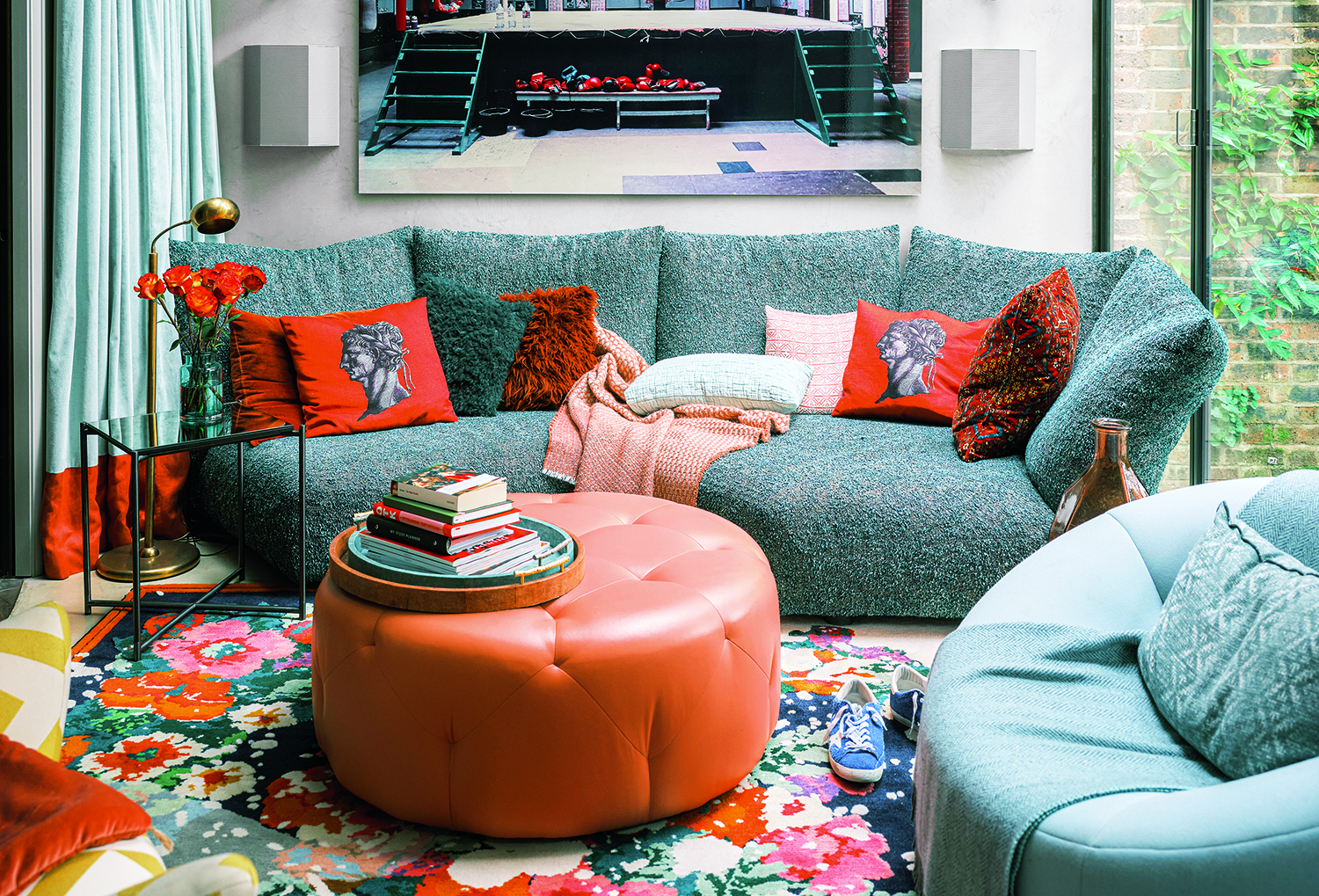
Your living room is more than just a space for entertaining; it’s a sanctuary where you unwind, relax, and spend quality time with loved ones. Creating a cozy living room involves a blend of comfort and style that makes the space inviting and functional. Here are some tips to help you achieve that perfect balance:
Choose the Right Furniture
Start with furniture that combines comfort and functionality. Opt for a plush sofa with deep cushions, perfect for lounging. Consider adding a cozy armchair or a recliner for additional seating. Make sure the furniture arrangement promotes conversation and allows for easy movement throughout the room.
Layer Your Lighting
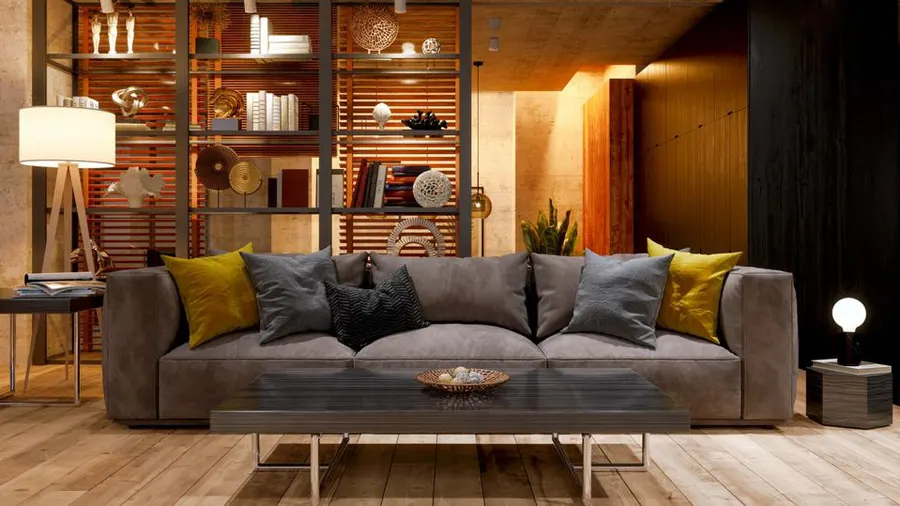
Lighting plays a crucial role in setting the mood. Use a mix of lighting sources to create a warm ambiance. Combine overhead lights with floor lamps, table lamps, and wall sconces. For added coziness, incorporate dimmers or smart bulbs that let you adjust the brightness to suit different times of day and activities.
Add Textures with Throws and Pillows
Textures are key to a cozy living room. Layer different fabrics, such as soft throw blankets, plush pillows, and textured rugs. Choose fabrics like wool, velvet, and cotton that add warmth and comfort. Mix and match patterns and colors to create visual interest and a personalized touch.
Incorporate Warm Colors
Color influences the feel of a room. Opt for warm, neutral tones like beige, taupe, or soft gray for a calming effect. Accents in rich colors like deep blues, earthy greens, or warm terracotta can add depth and coziness. Use these colors in your furniture, accessories, and wall decor.
Use Rugs to Define Spaces
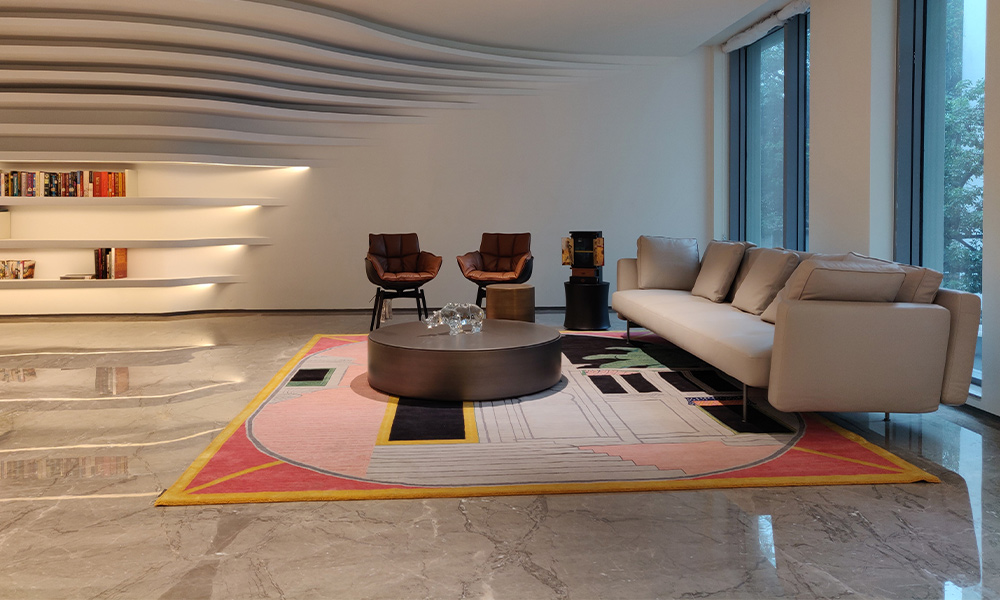
Rugs can help define different areas within a living room and add a layer of warmth underfoot. Choose a rug that complements your furniture and adds softness to the space. A large area rug can anchor the room, while smaller rugs can be used to highlight specific areas, like a reading nook or conversation zone.
Incorporate Natural Elements
Bring the outdoors in by incorporating natural elements. Plants not only add a touch of greenery but also improve air quality and create a calming atmosphere. Choose low-maintenance plants like succulents or snake plants if you’re not an avid gardener. Wooden furniture or decor pieces can also add a natural, grounded feel to the room.
Personalize with Artwork and Décor
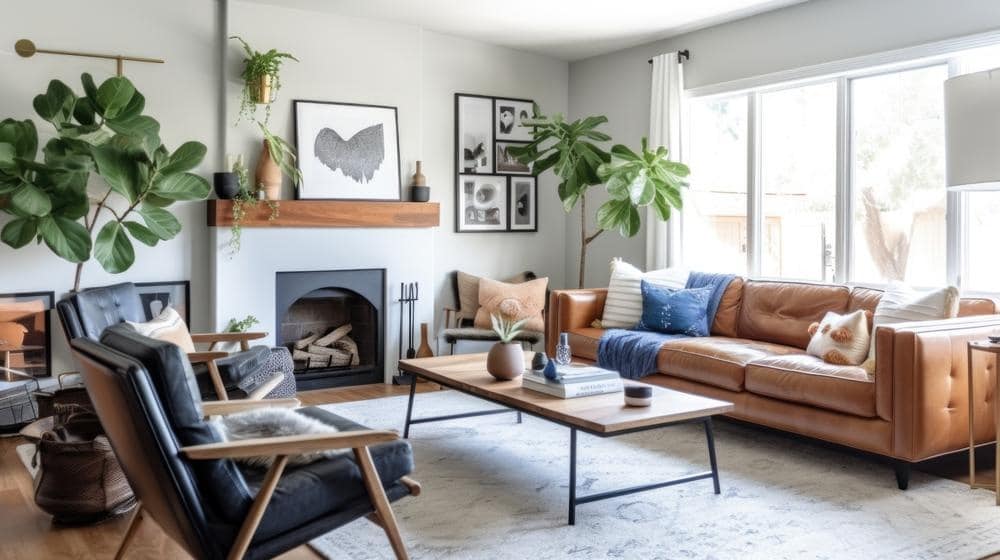
Add personality to your living room with artwork and decorative items that reflect your style. Choose pieces that resonate with you, whether it’s family photos, abstract art, or vintage finds. Arrange decor items in groups to create visual interest and avoid clutter.
Create a Focal Point
A focal point helps draw the eye and creates a sense of balance in the room. This could be a fireplace, a statement piece of art, or a stylish coffee table. Arrange your furniture and decor around this focal point to enhance the room’s overall cohesion and appeal.
Invest in Quality Window Treatments
Window treatments can impact both the look and feel of your living room. Opt for curtains or blinds that provide privacy while allowing natural light to filter through. Choose fabrics that complement your decor and add texture, such as linen or velvet.
Add Personal Touches
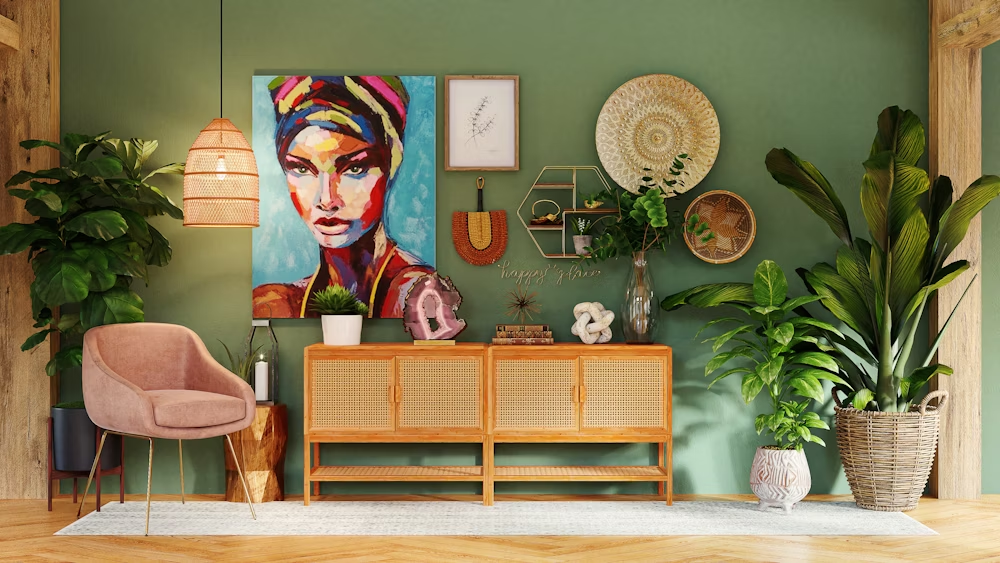
Finally, make the space truly yours by adding personal touches. Incorporate items that have sentimental value or reflect your interests and hobbies. Whether it’s a collection of travel souvenirs, a beloved quilt, or unique decorative objects, these elements will make your living room feel more inviting and personal.
By thoughtfully combining these elements, you can create a cozy living room that serves as a comfortable retreat and a stylish gathering place for friends and family. Enjoy the process of making your space uniquely yours and revel in the comfort and warmth it provides.
Architecture
The Art of Feng Shui: Creating Harmony in Your Home

Feng Shui, an ancient Chinese art and science, is all about creating harmony and balance in our living spaces. By arranging our homes in accordance with Feng Shui principles, we can invite positive energy, known as “chi,” into our lives and promote health, wealth, and happiness. In this blog post, we’ll explore the fundamentals of Feng Shui and share practical tips for applying its principles to create a harmonious and inviting home environment.
Understanding the Basics of Feng Shui:
Feng Shui is based on the concept of “chi,” or life force energy, which flows through our environments and influences our well-being. The goal of Feng Shui is to create a harmonious flow of chi by arranging our surroundings in a way that promotes balance and harmony. This includes paying attention to the layout, orientation, and organization of our homes to optimize the flow of energy.
The Five Elements of Feng Shui:
In Feng Shui, there are five elements—wood, fire, earth, metal, and water—that represent different qualities and energies. By incorporating these elements into our home decor, we can create a sense of balance and harmony. For example, wood represents growth and vitality, while water symbolizes flow and abundance. By incorporating a balance of these elements into our living spaces, we can enhance the flow of positive energy and create a sense of equilibrium.
Applying Feng Shui Principles to Your Home:
Clearing Clutter: Clutter can block the flow of chi and create stagnant energy in our homes. Start by decluttering your space and getting rid of items that no longer serve a purpose. This will create space for fresh energy to flow and rejuvenate your home.
Balancing Yin and Yang: In Feng Shui, yin and yang represent the balance of feminine and masculine energies. Create a harmonious balance of yin and yang in your home by incorporating soft, nurturing elements (yin) with strong, active elements (yang).
Enhancing the Flow of Chi: Pay attention to the layout and arrangement of furniture in your home to optimize the flow of chi. Avoid placing furniture in direct line with doorways or blocking pathways, as this can disrupt the flow of energy. Instead, create open and inviting spaces that allow chi to circulate freely.
Incorporating Nature: Bring the outdoors in by incorporating elements of nature into your home decor. Plants, natural materials, and natural light can enhance the flow of chi and create a sense of vitality and well-being in your living spaces.
Room-By-Room Feng Shui Tips:
Living Room: Arrange furniture in a circular or semi-circular layout to encourage conversation and social interaction. Use soft, natural fabrics and incorporate elements of wood and fire to create warmth and intimacy.
Bedroom: Position your bed diagonally across from the door to command a clear view of the room while you sleep. Keep the space under your bed clear and clutter-free to promote restful sleep and relaxation.
Kitchen: Keep your kitchen clean, organized, and clutter-free to promote health and abundance. Incorporate elements of fire and earth, such as candles and earthy tones, to create a warm and inviting atmosphere for cooking and dining.
By incorporating the principles of Feng Shui into your home decor, you can create a harmonious and balanced living environment that supports your health, happiness, and overall well-being. Whether you’re decluttering your space, balancing yin and yang energies, or enhancing the flow of chi, the art of Feng Shui offers timeless wisdom and practical guidance for creating a sanctuary of peace and tranquility in your home.
Architecture
5 Sustainable Interior Design Trends to Embrace in 2024
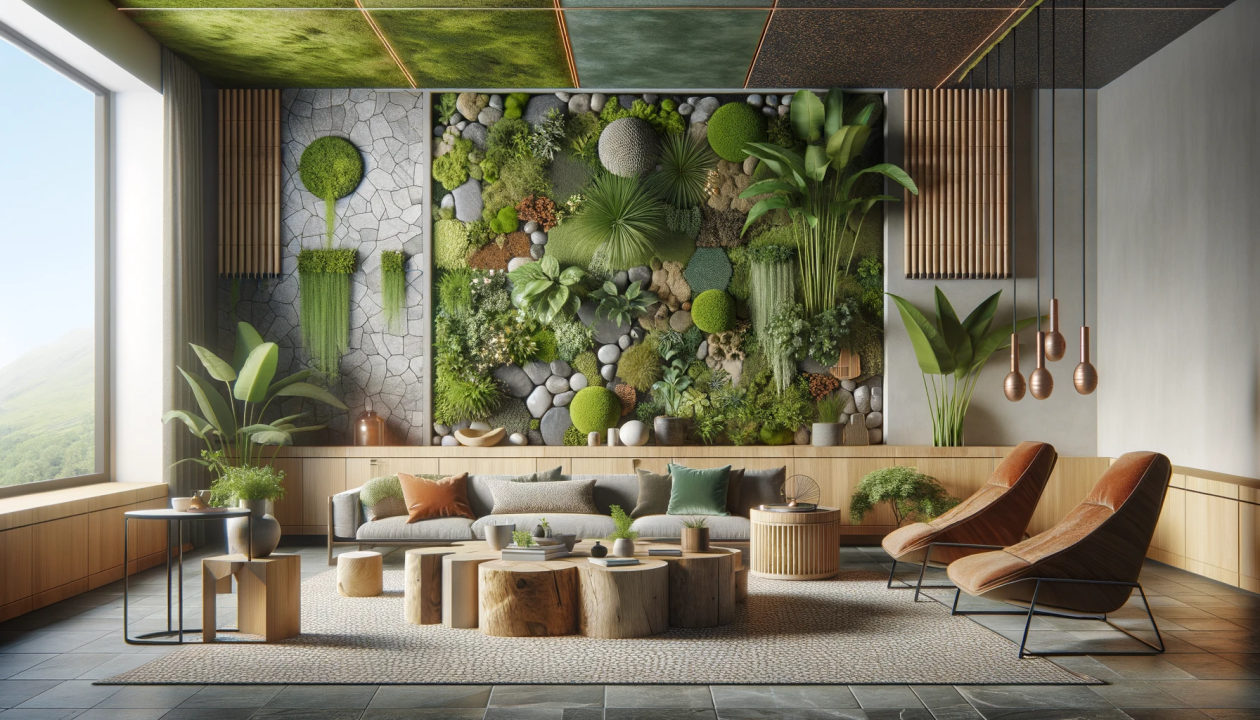
As the world becomes increasingly aware of the importance of sustainability, it’s no surprise that eco-friendly practices are making their way into the realm of interior design. In 2024, we can expect to see a surge in sustainable interior design trends that not only enhance the beauty of our living spaces but also minimise our environmental footprint. From repurposed materials to energy-efficient solutions, here are five sustainable interior design trends to embrace this year.
Upcycled Furniture:
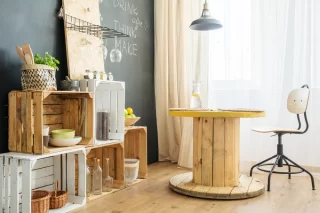
One of the most prominent sustainable interior design trends of 2024 is the use of upcycled furniture. Instead of buying new pieces, consider giving old furniture a new lease on life by refurbishing or repurposing them. From reclaimed wood tables to refurbished chairs, upcycled furniture adds character and charm to your space while reducing waste and conserving resources.
Biophilic Design:
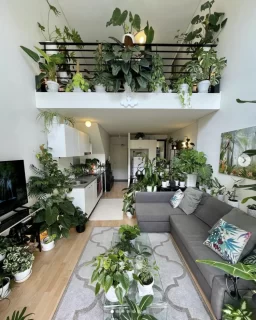
Biophilic design, which emphasizes a connection to nature, continues to gain popularity in 2024. Integrating natural elements such as plants, natural light, and organic materials into your interior design not only enhances aesthetics but also promotes well-being and sustainability. Consider incorporating living walls, indoor gardens, and sustainable wood finishes to bring the outdoors inside and create a healthier living environment.
Energy-Efficient Lighting:
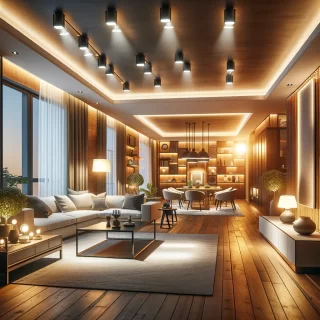
With a growing focus on energy conservation, energy-efficient lighting solutions are becoming a staple in sustainable interior design. LED lights, in particular, consume significantly less energy than traditional incandescent bulbs and last much longer, reducing both energy consumption and maintenance costs. Additionally, consider incorporating natural light sources such as skylights and large windows to maximize daylight and minimize the need for artificial lighting during the day.
Sustainable Textiles:
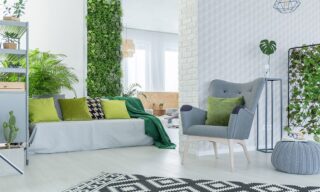
When it comes to upholstery and soft furnishings, opting for sustainable textiles is key to reducing environmental impact. Look for fabrics made from organic or recycled materials, such as organic cotton, hemp, bamboo, or recycled polyester. These materials not only reduce the use of harmful chemicals and pesticides but also minimize waste and support eco-friendly production practices. Additionally, consider investing in durable, high-quality textiles that stand the test of time, reducing the need for frequent replacements.
Smart Home Technology:

In 2024, smart home technology continues to evolve, offering innovative solutions for sustainable living. From smart thermostats that optimize energy usage to home automation systems that control lighting and appliances, these technologies can help reduce energy consumption and increase efficiency in your home. Additionally, smart home devices such as occupancy sensors and smart meters provide valuable insights into your energy usage, empowering you to make informed decisions about resource management and conservation.
As we strive to create more sustainable living environments, embracing these five interior design trends can help reduce our environmental impact while creating beautiful and functional spaces. Whether you’re upcycling old furniture, incorporating natural elements, or investing in energy-efficient technologies, every sustainable choice contributes to a greener future for generations to come. So let’s embrace these trends and make sustainability a cornerstone of our interior design practices in 2024 and beyond.
-

 Style11 months ago
Style11 months agoBridal Guide : Best Looks of Radhika Merchant Ambani
-

 Fashion1 year ago
Fashion1 year agoMost Discussed Ajrakh Saree of Alia Bhatt
-

 Entertainment1 year ago
Entertainment1 year agoBridal Bliss : All Bridal Looks of Swasika Vijay
-

 Movies1 year ago
Movies1 year agoA Nostalgic Journey Through Love &Cinema : Best Bollywood Romantic 90s Movies
-
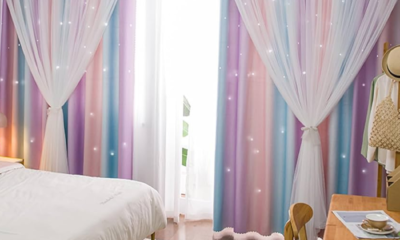
 AD8 months ago
AD8 months agoPopular Curtain Fabrics to Consider for Your Home
-

 Events9 months ago
Events9 months agoBest of Fashion Looks : Diya Krishna Wedding
-

 Events8 months ago
Events8 months agoThe L’Oréal Paris Show at Paris Fashion Week 2024
-

 news8 months ago
news8 months agoLaapataa Ladies: Kiran Rao’s Social Satire Becomes India’s Official Entry for the 2025 Oscars

